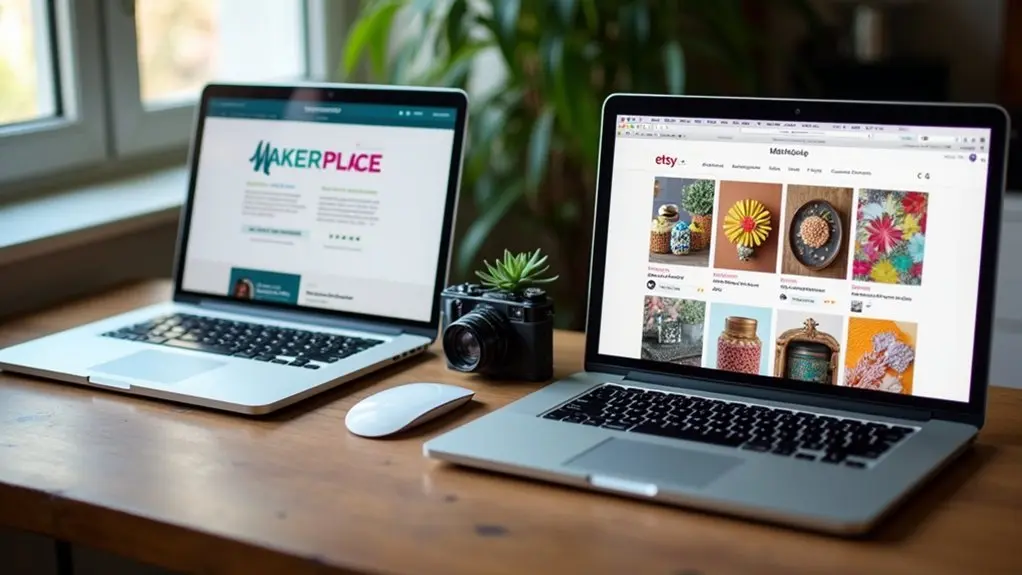Choosing between Big Cartel and Etsy for small businesses depends on specific needs. Big Cartel favors independent artists and small creators with its no transaction fees and customizable store designs. Etsy, with its vast seller network and built-in audience, offers global visibility but includes complex fees. Studying each platform’s focus—brand control or marketplace exposure—guides the decision. Exploring further uncovers which aligns best with business goals.
Key Takeaways
- Big Cartel offers greater brand customization and autonomy, ideal for businesses prioritizing unique identity and control over store design.
- Etsy provides significant visibility with a vast global audience, beneficial for sellers seeking exposure and access to a large buyer base.
- Big Cartel’s straightforward pricing with no transaction fees makes it more budget-friendly for small businesses with limited inventories.
- Etsy’s complex fee structure can increase costs, particularly for high-volume sellers, despite its extensive marketing support and user base.
- Big Cartel is suitable for independent creators with simple eCommerce needs, while Etsy caters to sellers wanting higher visibility and traffic.
Audience and Purpose
When comparing the audience and purpose of Big Cartel and Etsy, it becomes evident that each platform serves distinct niches within the creative business sector.
Big Cartel primarily targets independent artists and small businesses seeking to establish a unique brand identity, emphasizing autonomy and simplicity in eCommerce. It caters to sellers with smaller inventories who prefer less competition and greater control over their storefronts.
In contrast, Etsy functions as a global marketplace for handmade and vintage items, connecting over 7 million sellers with 90 million buyers. This centralized marketplace offers extensive traffic and a built-in audience, ideal for small businesses aiming for broad visibility. However, this comes with increased competition among sellers.
Both platforms, established in 2005, support creative entrepreneurs but serve different strategic needs.
Store Design and Branding
In comparing store design and branding, Big Cartel offers sellers the opportunity for independent branding through personalized stores and unique websites. This contrasts with Etsy’s marketplace model that limits customization.
Data shows Big Cartel provides over 15 free mobile-responsive templates, enabling more extensive tailoring of shop appearance. Meanwhile, Etsy prioritizes a uniform shopping experience that may limit individual brand visibility.
The structural differences between the platforms result in Big Cartel supporting distinct aesthetic identities, whereas Etsy’s design constraints focus on cohesive marketplace navigation.
Marketplace Visibility Limitations
How does the marketplace visibility on platforms like Etsy and Big Cartel impact store design and branding for small businesses?
Etsy’s marketplace visibility limitations arise from its large, competitive environment where sellers face standardized store layouts, restricting branding opportunities. This environment resembles a local market, with numerous vendors competing for buyer attention, hence diluting individual seller visibility.
Consequently, sellers on Etsy have limited customization options, posing challenges in establishing a unique brand identity.
Conversely, Big Cartel offers significant advantages in store design and branding. By allowing fully customizable stores with unique web addresses, it provides sellers with greater control over their brand presentation.
This flexibility enables tailored customer attraction strategies, enhancing the distinctiveness and visibility of each store compared to Etsy’s uniform approach.
Independent Branding Opportunities
The competitive nature of Etsy’s marketplace visibility underscores the significance of independent branding opportunities for small businesses seeking to differentiate themselves.
Big Cartel provides independent creators with significant customization options, offering over 15 mobile-responsive templates and a code editor for advanced customization. This fosters strong brand identity through personalized store designs and unique web addresses.
In contrast, Etsy’s uniform design and limited branding options may impede sellers from establishing a distinctive presence. The ability to create a cohesive brand identity on Big Cartel allows sellers to develop tailored strategies for attracting customers, unlike Etsy’s crowded marketplace environment.
Consequently, Big Cartel’s emphasis on branding independence and user-friendly customization tools supports the distinctiveness and personalization essential for independent creators aiming to stand out.
Customization and Design Constraints
While customization is a pivotal factor in online store design, Big Cartel provides a significant advantage over Etsy by offering sellers greater control over their brand’s appearance.
Big Cartel empowers users with customizable templates and unique web addresses, fostering a distinct branding experience. With over 15 mobile-responsive themes and a code editor available for advanced users on paid plans, sellers can tailor their store’s design to their specific style, enhancing brand differentiation.
In contrast, Etsy enforces a standardized look with minimal customization options, restricting sellers to a cohesive marketplace layout. This design constraint on Etsy can impede sellers’ ability to stand out, whereas Big Cartel’s focus on customization supports unique branding opportunities for independent creators aiming to establish a personalized online presence.
Pricing Plans and Fees
In the evaluation of pricing plans and fees, Big Cartel and Etsy present distinct approaches that cater to different business needs.
Big Cartel offers a more straightforward pricing plan with a free option for up to five products, scaling to $15 monthly for 50 products and $30 for 500 products, all without transaction fees. This structure is predictable and cost-effective, particularly for small inventories.
Conversely, Etsy employs a more complex fee system, charging a $0.20 listing fee and a 6.5% transaction fee per sale, supplemented by a payment processing fee of 4% plus $0.32 per transaction. These cumulative fees can considerably impact high-volume sellers.
Hence, Big Cartel may be more economical for smaller businesses, while Etsy’s costs may escalate.
Customization and Features
Although both Big Cartel and Etsy offer platforms for small businesses to establish their online presence, their customization options and features reveal considerable differences in flexibility and functionality.
Big Cartel provides over 15 free mobile-responsive templates and basic customization tools, with advanced customization available through a code editor in paid plans. This allows sellers to personalize their online store considerably.
Big Cartel offers mobile-responsive templates and a code editor for advanced store customization in paid plans.
Conversely, Etsy lacks customizable templates, enforcing a uniform layout that offers limited branding options, which may not satisfy sellers looking for a unique online store identity.
Additionally, Big Cartel’s features focus on physical goods, requiring third-party apps for digital sales, whereas Etsy seamlessly supports both product types.
Moreover, Etsy’s shipping features, including discounted labels and a robust editor, offer greater efficiency compared to Big Cartel’s basic options.
Marketing and Ecommerce Tools
When evaluating the marketing and eCommerce tools offered by Big Cartel and Etsy, distinct differences emerge in their approach to supporting small business growth.
Big Cartel provides essential marketing tools such as email campaigns and cart recovery but lacks advanced e-commerce features, which could limit scalability.
In contrast, Etsy offers basic marketing tools, including shop ads and social media sharing, that enhance visibility within its platform, though seller competition can affect this.
- Big Cartel: Supports external marketing with integrations but lacks a native blogging feature, limiting content marketing.
- Etsy: Utilizes Etsy Ads and social media integration for broader audience reach.
- Visibility: Etsy’s SEO strategies optimize seller visibility during high-demand periods.
- Brand Identity: Big Cartel emphasizes simplicity and brand identity in its marketing approach.
Transaction Fees and Pricing Models
Considering the transaction fees and pricing models of Big Cartel and Etsy, a clear distinction emerges in their cost structures and financial implications for small businesses.
Big Cartel offers a straightforward approach with no transaction fees and a free plan for up to 5 products. Their paid plans range from $15 to $30 monthly, accommodating up to 500 products, thereby appealing to businesses with limited inventory.
In contrast, Etsy’s pricing model includes a $0.20 listing fee per item, a 6.5% transaction fee, and a 4% + $0.32 payment processing fee per sale. These costs can result in monthly expenses between $100 and $300 for high-volume sellers.
Ultimately, Big Cartel is typically the more budget-friendly option, especially for independent creators.
Customer Support and Alternatives
While evaluating customer support options for small businesses, a clear contrast is observed between Big Cartel and Etsy. Big Cartel offers customer support via email and chat with a small team of 10 agents, whereas Etsy support provides a more thorough system, including live chat and phone support, catering to a broader user base.
The divergence in support methods emphasizes Etsy’s diverse options for immediate assistance.
For sellers seeking alternatives, several platforms offer unique features:
- Shopify – Known for robust features and scalability.
- Wix – Offers beginner-friendly templates.
- Square Online – Provides a cost-effective free selling plan.
- Ecwid – Known for user-friendliness and integration capabilities.
Additionally, services like LitExtension facilitate seamless changes for sellers migrating from other platforms to Etsy.
Target Audience and Use Cases
Big Cartel and Etsy cater to distinct buyer demographics, each platform aligning with specific business needs.
Big Cartel is tailored for independent creators with a strong focus on brand identity and control, appealing to sellers with niche or limited product ranges.
In contrast, Etsy attracts buyers interested in handmade and vintage items, offering artisans access to a large, established customer base seeking unique and artisanal products.
Ideal Buyer Demographics
When analyzing the ideal buyer demographics for Big Cartel and Etsy, distinct characteristics emerge that cater to varied business needs.
Big Cartel attracts independent artists, designers, and small businesses with limited product inventories. This platform is for those who prioritize establishing a strong brand identity with a customized approach.
In contrast, Etsy appeals to a diverse customer base seeking handmade, vintage, and craft supply products, providing sellers significant visibility through its vast marketplace.
- Big Cartel: Ideal for niche markets focused on unique, non-mass-produced items.
- Etsy: Attracts a broader audience with over 90 million active buyers.
- Brand Independence: Big Cartel supports sellers aiming for brand autonomy.
- Marketplace Traffic: Etsy offers access to an established, extensive consumer base.
Both platforms serve creatives but with different customer engagement strategies.
Best-Selling Product Types
Understanding the ideal buyer demographics lays the groundwork for identifying best-selling product types on platforms like Big Cartel and Etsy.
Big Cartel is a best fit for independent artists and designers offering unique, limited-inventory products, including digital goods. Its appeal lies in brand independence and customization, attracting niche markets.
Conversely, Etsy caters to artisans and crafters specializing in handmade, vintage, or craft supplies, with its expansive marketplace reaching over 90 million active buyers. This structure leverages significant traffic, ideal for popular or trending items in these categories.
Sellers on both platforms benefit from aligning product types with their target audience, with Big Cartel serving niche interests and Etsy connecting broader demographics with unique crafts and artisanal goods.
Ease of Use
Ease of use is a critical factor when evaluating e-commerce platforms like Big Cartel and Etsy. Both platforms aim for intuitive user experiences; however, they cater to different audience needs.
- Big Cartel: Known for its straightforward drag-and-drop interface, Big Cartel is ideal for small businesses seeking a dedicated storefront without the complexities of a marketplace. This simplicity aids users with minimal technical skills in managing their shops effectively.
- Etsy: Offers a user-friendly interface supporting extensive product listings, but sellers must navigate a more complex marketplace environment, which might overwhelm beginners.
- Navigation: Big Cartel provides more straightforward navigation, attracting those who prefer simplicity.
- Setup Complexity: While Etsy’s setup is quick, its thorough marketplace features can complicate the user experience for new sellers.
Overall Preference and Recommendations
When evaluating platforms for small business needs, Etsy and Big Cartel present distinct advantages based on audience targeting, cost-effectiveness, and branding capabilities.
Etsy’s expansive buyer base of over 90 million provides substantial visibility, whereas Big Cartel’s lack of transaction fees enhances profitability for low-inventory sellers.
Additionally, businesses prioritizing unique branding may prefer Big Cartel’s customizable options over Etsy’s standardized layouts.
Audience Targeting Differences
Although both Big Cartel and Etsy serve as platforms for small businesses, their approaches to audience targeting reveal distinct preferences and recommendations.
Big Cartel attracts independent artists and small businesses desiring brand independence, offering a user-friendly setup ideal for limited product inventories.
Conversely, Etsy appeals to artisans selling handmade, vintage, or craft supplies, benefitting from a built-in marketplace with over 90 million active buyers.
Key differences include:
- Target Audience: Big Cartel focuses on creativity and unique branding, while Etsy leverages existing traffic.
- Market Competition: Etsy’s extensive marketplace structure results in intensified competition.
- Brand Identity: Big Cartel is favorable for establishing strong brand identities.
- Buyer Engagement: Etsy provides opportunities through its vast customer base, enhancing seller visibility.
Cost-Effectiveness Comparison
In evaluating the cost-effectiveness for small businesses choosing between Big Cartel and Etsy, the analysis reveals distinct advantages for each platform.
Big Cartel offers a more cost-effective solution for small businesses with limited inventories, thanks to its free plan for up to five products and paid plans starting at $15/month without transaction fees. This allows sellers to retain full profits, enhancing profitability.
Conversely, Etsy’s fee structure includes a $0.20 listing fee, a 6.5% transaction fee, and additional payment processing fees, which can escalate monthly costs to between $100-$300. These fees can considerably reduce revenues and complicate budgeting for small businesses.
As a result, for those prioritizing affordability and simplicity, Big Cartel emerges as the preferred choice over Etsy.
Branding and Customization
After evaluating cost-effectiveness, attention shifts to the critical components of branding and customization, where Big Cartel and Etsy present distinct offerings.
Big Cartel empowers sellers to create a unique brand identity through full customization with over 15 mobile-responsive templates. In contrast, Etsy limits customization, offering a standardized storefront design which may dilute individual branding efforts.
Key differences include:
- Customization Options: Big Cartel’s HTML/CSS coding allows for a personalized aesthetic, while Etsy restricts sellers to a uniform layout.
- Website Flexibility: Big Cartel supports customizable websites, enhancing brand independence.
- Marketplace Design: Etsy’s format can resemble a local craft fair, potentially hindering unique branding.
- Audience Access: Etsy offers a built-in audience, but with limited branding distinction.
Ultimately, Big Cartel is preferable for those prioritizing brand independence.
Frequently Asked Questions
Is Etsy or Big Cartel Better?
Etsy fees impact profitability, while Big Cartel features emphasize brand independence. Sales strategies differ: Etsy offers high exposure through its vast marketplace, whereas Big Cartel allows personalized branding and control. Choice depends on business goals and priorities.
What Is Better Than Big Cartel?
Shopify offers extensive scalability and advanced tools, providing a robust alternative to Big Cartel. WooCommerce benefits include flexibility and integration with WordPress. Squarespace alternatives excel in design, ideal for aesthetically-focused businesses seeking a thorough eCommerce solution.
Is Big Cartel a Good Site to Sell On?
Selling on Big Cartel offers advantages due to its user-friendly interface and cost-effectiveness. With Big Cartel features like customizable templates and no transaction fees, combined with competitive pricing models, it suits small businesses prioritizing branding and simplicity.
What Percentage Does Big Cartel Take?
Big Cartel’s commission structure is favorable for sellers, as they retain 100% of their sales profits. The platform’s pricing plans involve subscription fees without transaction fees, except standard payment processing charges of 2.9% plus $0.30 per transaction.
Conclusion
In comparing Big Cartel and Etsy, small businesses must weigh various factors. Etsy offers a large marketplace and integrated audience, benefiting those seeking exposure, but with higher fees. Big Cartel allows greater customization and lower costs, suiting brands wanting control over their storefront. Data suggests Etsy is ideal for broad visibility, while Big Cartel excels for niche branding and personalization. Ultimately, the choice depends on a business’s specific goals, resources, and desired level of market integration.




